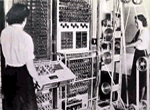I have blogged a few times about the importance of maintaining your digital afterlife, but I was reminded of another personal digital archiving issue over the weekend when an opinion piece appeared in the New York Times about the problems involved in the preservation of digital files and the potential for a "digital dark age."
The piece started out with the story of the University of Texas acquiring the papers of Bruce Sterling, one of the founders of the cyberpunk genre of science fiction and a well-quoted futurist. Interestingly, the Times piece said, Mr. Sterling's papers did not contain any floppy disks or CD-ROMs among them. When he was asked why, Mr. Sterling was quoted in the Times as saying:
"There are forms of media which are just inherently unstable and the attempt to stabilize them is like the attempt to go out and stabilize the corkboard at the laundromat."
The remainder of the article goes on to describe the problems of digital record preservation, and the need to think instead of "curating" digital records. Curating digital records means "to continuously maintain and improve" them rather than trying to save the records after they've stopped being useful, sort of speak. The problem is that by the time we decide to preserve a digital record, the devices needed to read the file formats are often no longer readily available.
There is a one-pager describing the issues involved in (and a proposed solution to) curating digital engineering documents here (PDF), if you are interested.
The problem becomes more complex as more hard-copy library and other document/book collections become digitized for ease of access as well as to reduce the space required to keep hard copies of printed matter.
Coincidentally, there was a recent AP story about the efforts of Brewster Kahle, who founded the Internet Archive in 1996, to preserve a copy of every book ever published. The Internet Archive aims to offer "permanent access for researchers, historians, scholars, people with disabilities, and the general public to historical collections that exist in digital format." Mr. Kahle says in the AP story that
"The dedicated idea is to have the physical safety for these physical materials for the long haul and then have the digital versions accessible to the world."
Apparently Mr. Kahle, the story says, "found his faith in bits and bytes wasn't strong enough to cast paper and ink aside. Even as an ardent believer in the promise of the Internet to make knowledge more accessible to more people than ever, he feared the rise of an overconfident digital utopianism about electronic books."
So far, Mr. Kahle has collected 500,000 books, now stored in shipping containers in a climate controlled warehouse in Richmond, Calif.
Like the rest of you, I have thousands of digital pictures and hundreds of hours of video of my children (now in HD as well as Super 8), and probably like most of you, I try to occasionally print out using long lasting inks at least important pictures. For example, I took a special father-daughter trip last year, and we created a digital photo/video album on the fly of our journey. I also made sure my daughter printed out a hard-copy of the pictures that meant the most to her, and they are duly annotated in a physical photo album as well (along with a CD-ROM which may or may not be accessible in the future).
But I also know there are many, many photos and videos that will probably be lost forever in a digital netherworld.
The problem of digital preservation/curating is one without easy answers for the professional archivist, let alone the layperson. I am curious about how you plan to keep your own personal digital archives of photos, videos and other memorabilia—do you keep an old VCR around so you can play your old video tapes? Do any of you use digital archiving services not only to preserve pictures, but also for important documents in case of a flood, fire, or other disaster?
And do any of you worry how your grandchildren—or even children—will know what you looked like as a child if all that exist are digital pictures of you? Or are you resigned to the fact that some things digitally captured today are just going to be lost forever in a future "family digital dark age"?
Robert N. Charette is a Contributing Editor to IEEE Spectrum and an acknowledged international authority on information technology and systems risk management. A self-described “risk ecologist,” he is interested in the intersections of business, political, technological, and societal risks. Charette is an award-winning author of multiple books and numerous articles on the subjects of risk management, project and program management, innovation, and entrepreneurship. A Life Senior Member of the IEEE, Charette was a recipient of the IEEE Computer Society’s Golden Core Award in 2008.



